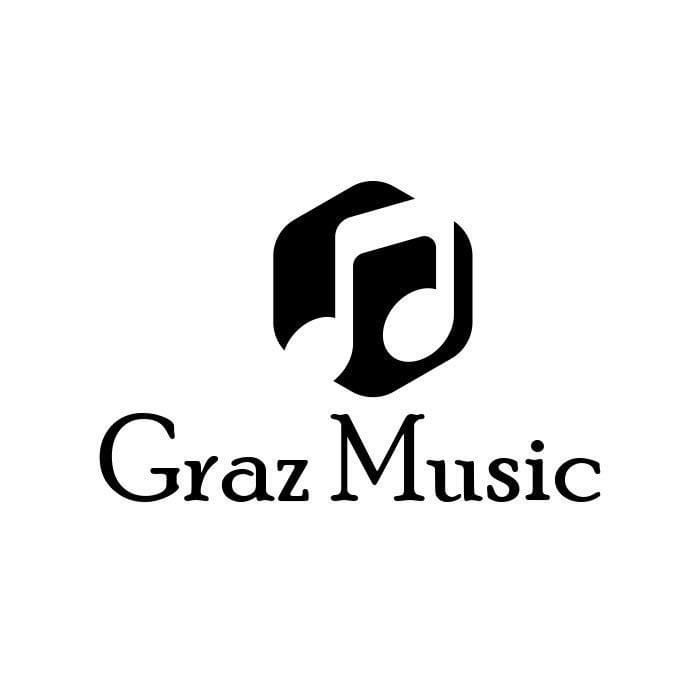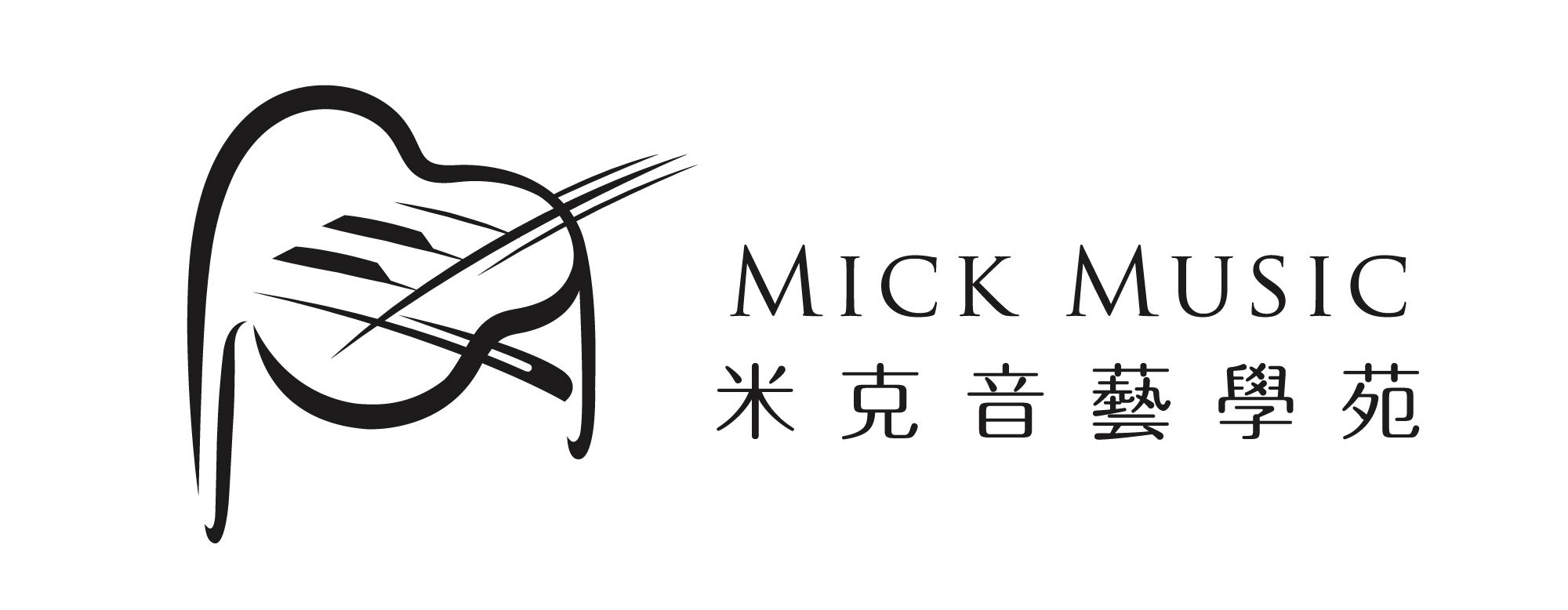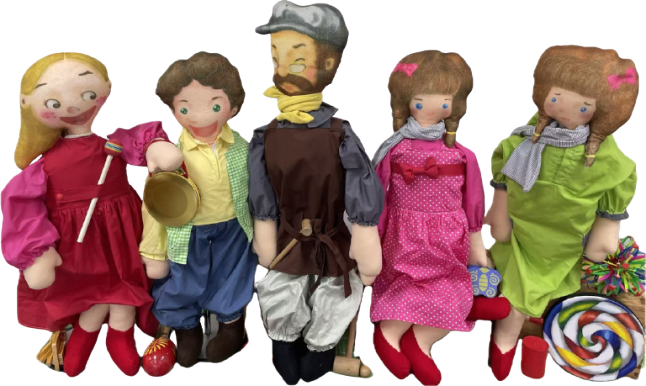
Welcome to Our Music Time
We inspire the next generation of music educators and performers to shape the future of the arts and shine on the global stage.
About Our Music Time
What is Our Music Time?
OUR MUSIC TIME was founded in 2025 by Chiunglien Liu in San Jose, California. She is the CEO of OUR MUSIC TIME and the author of numerous books. In the 2000s, Chiunglien combined Eastern and Western cultures with her decades of teaching experience and pedagogical research, creating a solid foundation for students to learn music, particularly musicianship. Chiunglien's work gradually evolved to include the sharing of engaging and challenging activities with music educators. Her approach not only motivated teachers but also inspired students to immerse themselves in their instrument learning. By stimulating both the right and left hemispheres of the brain, Chiunglien's methods encourage physical engagement with music, fostering a holistic learning environment that emphasizes creativity alongside technical skill development.
Read More
Teacher Training
Passionate about music education? Join our teacher training team and grow with us to create a better future for music education.
Sign Up
Meet the Author
Chiunglien Liu integrates Eastern and Western cultures with decades of teaching experience and pedagogical research, providing a solid foundation for children to learn music.
Resources
Systematic Design × Engaging Activities × Visual Learning × Piano Teaching Support
Our Fabulous Music Plans for Private & Group Lessons is a spiral-based curriculum designed for both group and individual lessons. Spanning beginner to advanced levels, it gradually develops students’ ear training, theory, and musical understanding. The series includes colorful, child-friendly flashcards to enhance interaction and motivation in class.
Our Fabulous Music Plans for Private and Group Lessons

Lesson Plans Level I
- Visual aids for learning
- My First Piano Adventure A
- Student Piano Library 1

Lesson Plans Level II
- Staff-reading exercises
- My First Piano Adventure B
- Student Piano Library 1

Lesson Plans Level III
- Meter and rhythm
- Metronome integration
- A Dozen A Day
- Alfred Piano Course 1
5 Felt Storybooks
Singing with children is the first step in nurturing their interest and confidence in music.
Our Folk Songs & Rhymes for Children features 100 easy-to-remember folk songs in Chinese and English, with bilingual lyrics and educational value. Perfectly complements the three-volume Our Fabulous Music Plans for Private & Group Lessons series, offering rich resources for both music introduction and skill development.

Cobbler
- Steady beat & rhythm
- Note lengths with magnets
- Expression & breath control

Witch
- Sound differences
- High & low pitch
- Strong beats in meters

Lucy Lost Her Pocket
- Loud/soft contrasts
- Note lengths & rhythm
- Octaves & solfège

Charlie Over the Ocean
- Understand tempo changes
- Learn half notes and ties
- Phrasing with split eighth notes

I’ve Lost the Closet key
- Eighth rests in phrases
- Steady 4/4 meter
- Canons & ostinatos
Our Folk Songs & Rhymes for Children | The Bear Hunt
Singing with Your Little One is the first step in building confidence and interest in music.
Our Folk Songs & Rhymes for Children features 100 easy-to-remember folk songs in Chinese and English, with bilingual lyrics and educational value. Perfectly complements the three-volume Our Fabulous Music Plans for Private & Group Lessons series, offering rich resources for both music introduction and skill development.
We’re Going on a Bear Hunt adapted from the 1989 American folk-style rhythm book by Michael Rosen, this interactive story uses sound to bring characters to life. Ideal for read-aloud fun and music class activities, it helps children experience rhythm, storytelling, and music through movement and voice.

Folk Songs & Rhymes Collection
- 100 traditional folk songs and rhymes
- English and Chinese selections
- Includes translations

The Bear Hunt
- Interactive rhythmic word book
- Based on classic children's story
- Incorporates musical elements
- Steady beat & Ostinato patterns
Supplementary Teaching Materials
Making Pitch and Rhythm Come to Life
Have you ever wondered how to teach pitch and rhythm in a practical, engaging way? Pitch and rhythm can be abstract concepts—but with the Song Magnets, these ideas become clear, fun, and tangible. This powerful resource helps students grasp rhythm and duration through visual storytelling.
Have you wondered how to teach pitch and rhythm skills practically?
Pitch and rhythm are abstract and complex concepts, but this significant resource of 'Song Picture Magnet' makes the concepts of duration and rhythm less abstract, more fun, and more concrete. Teach your children to feel the pitch and rhythm even on the staff by singing selected folk songs with Colorful Picture Cards and Song Lyric Posters. They are multi-level resources and great for both individual and group classes.

Song Magnets
- 73 song and rhyme magnets for learning pitch and rhythm
- Two sizes relative to note values for easy visualization
- 5cm and 2.5cm heights for easy handling
- 20 Heart-shaped magnets for steady beat practice
- Includes quarter rest, repeat sign magnets, and canvas bags

Picture Cards
- 89 colorful cards for musical theory learning
- Musical Alphabet and Solfège integration
- Kodály sequence rhythm patterns
- Quarter to eighth note values
- Flexible rhythm pattern creation
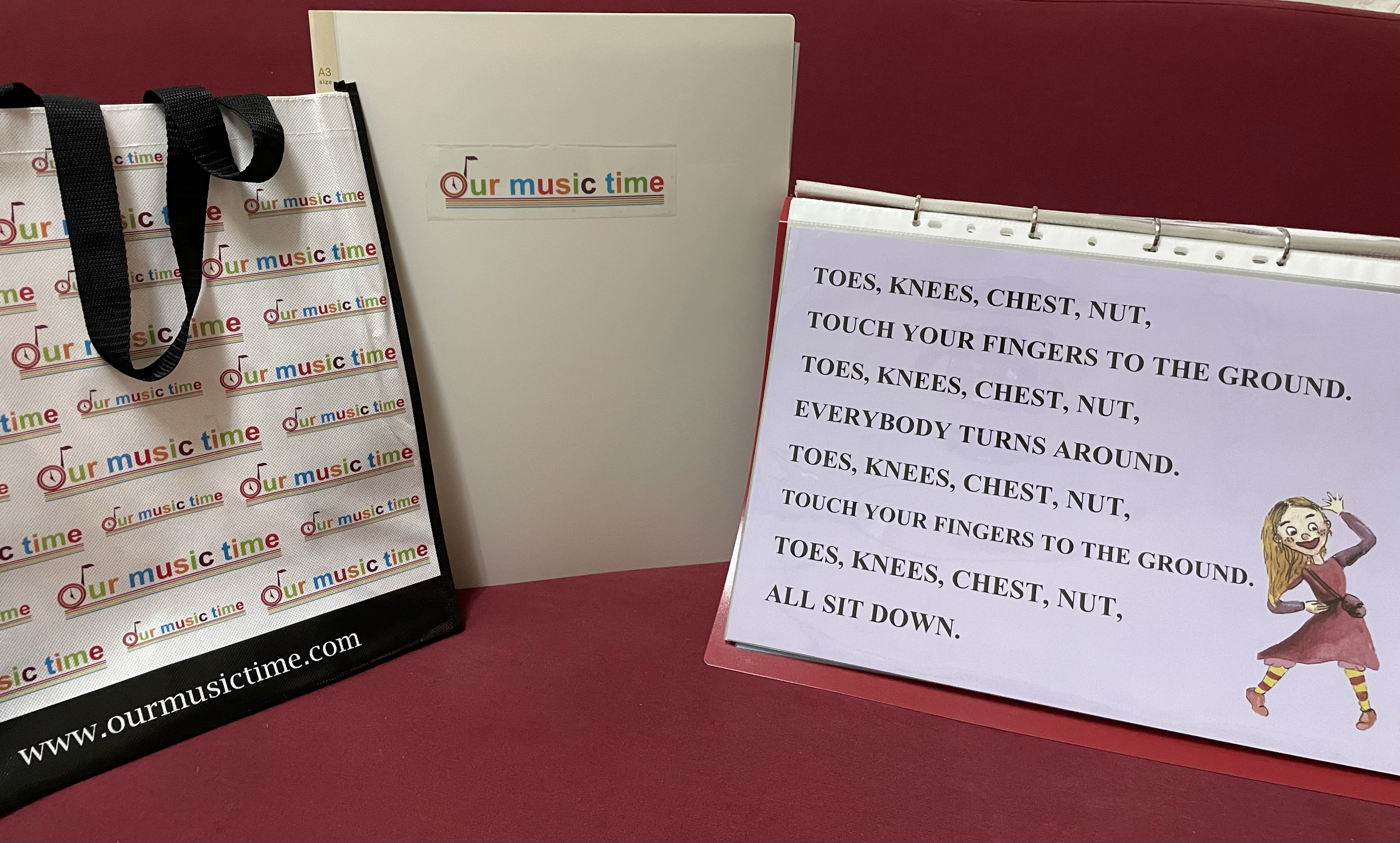
Lyric Posters
- 100 bilingual English-Chinese lyric posters
- Perfect for song learning and review
- Available in A3 and A1 sizes
- Protected in plastic sleeves
- Includes Our Music Time logo bag
Events
With every remarkable moment and every heartfelt chapter, we have written a story that is uniquely ours. Let us come together to honor the dedication and achievements we have built over the years.

2025 Events Photos
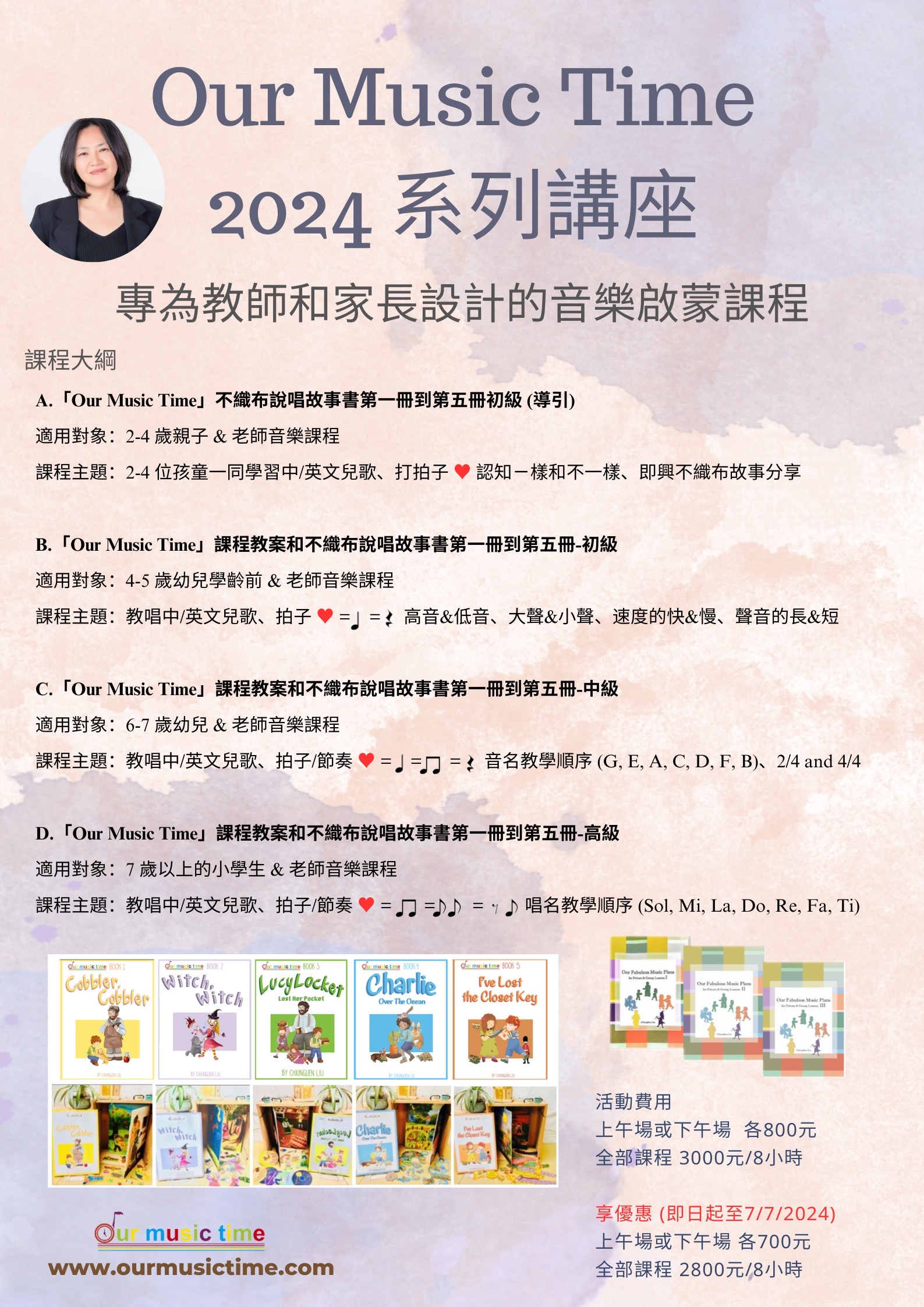
2024 Events Photos

2023 Events Photos

2022 Events Photos
Our Little Singers

Aurelia
Aurelia lives in Nova Scotia, Canada and is 9 years old. She loves to paint, dance, and bike. Aurelia is learning how to play the piano, the harp, & sing. She joined the choir Cappelia Regalis this spring. When she grows up, Aurelia wants to study Dinosaurs (Palaeontology)!

Isabelle
Aurelia lives in Nova Scotia, Canada and is 9 years old. She loves to paint, dance, and bike. Aurelia is learning how to play the piano, the harp, & sing. She joined the choir Cappelia Regalis this spring. When she grows up, Aurelia wants to study Dinosaurs (Palaeontology)!
5 Theme Songs of Recording
Let the melodies of English nursery rhymes awaken children’s inner sensitivity, guiding them into a beautiful world where music and language intertwine.
OUR MUSIC TIME features five theme songs recorded by Aurelia: Cobbler, Cobbler, Witch, Witch, Lucy Locket Lost Her Pocket, Charlie Over the Ocean, and I've Lost the Closet Key. These songs are ideal as sample recordings for the book Our Folk Songs & Rhymes for Children. Both teachers and children will enjoy learning the new songs from our young musician, Aurelia, with ease.
Teachers Training
Passionate about music education? Join our teacher training team and grow with us to create a better future for music education.
Course Description
Discover how Our Music Time Online courses can help teachers enhance their teaching. This teacher training course is designed not only for teachers starting with beginners or young students, but also for those who are teaching current students and may need specific pedagogy to help them overcome difficulties. Our online offers Elementary, Intermediate, and Advanced courses, including 100 Folk Song teaching, Musicianship training, Game and Activity learning, and a Certificate qualification for the Our Music Time database.
Instructors Database
Welcome to our database of teachers using OUR MUSIC TIME materials to teach general music classes or private lessons. If you are an instructor interested in being listed, please join our workshop. Our team will review and approve qualified applications after you complete our teacher training courses. Please sign up now for the Online 15-week courses with Chiunglien Liu.

Yu-Pei Hsiao
Yu-Pei Hsiao, Director of Graz Music and Chairperson of the Taiwan Science and Arts Education Association, is an experienced educator in piano, violin, and conducting. She has led her team to success in admissions, competitions, and ensemble training. Committed to supporting underprivileged children, she introduced the Kodály-based Our Music Time curriculum to build strong musical foundations.
Read More
Shuo-Li Hung
Shuo-Li Hung, with a Master’s in Piano from National Yang Ming Chiao Tung University, has taught piano and violin since 2010. Based in southern Taiwan, she is active in music education and chamber music, and founded a unique dual-piano hall in Kaohsiung. She introduced the Kodály-based Our Music Time curriculum, using custom tools and bilingual folk songs to foster musical
Read More
Chen-Yu Kao
Chen-Yu Kao, a graduate of Tainan National University of the Arts, is a music teacher and orchestra director at Xinzhuang Elementary School. Specializing in wind instruments, piano, and early childhood education, her students excel in national competitions. She promotes the Kodály-based Our Music Time curriculum, using songs, stories, and movement to make learning joyful and engaging.
Read More
Chao-Jung Chen
Chao-Jung Chen teaches piano and early childhood music in the Yunlin–Chiayi region, including at community childcare centers. Using a child-centered approach, she creates engaging, age-appropriate lessons. By integrating the Our Music Time curriculum, she fosters a playful and joyful space for musical exploration—well-received by students and parents alike.
Read MoreCollaborating Music Schools
In Taiwan, Our Music Time is dedicated to promoting collaborative music education and offers professional teacher training programs to help music schools and private instructors develop effective, personalized teaching methods. Through a variety of cooperative projects, we ensure that music education becomes an integral part of every child's learning journey, while also inspiring educators with renewed creativity and passion for teaching. This is the ideal choice to take your music teaching career to the next level!

